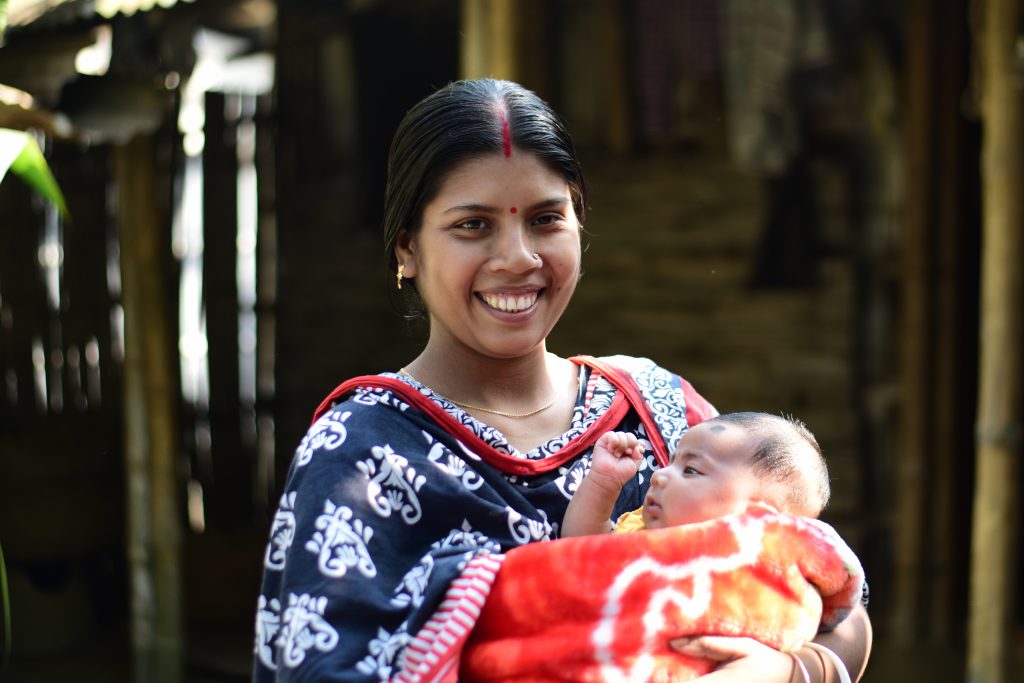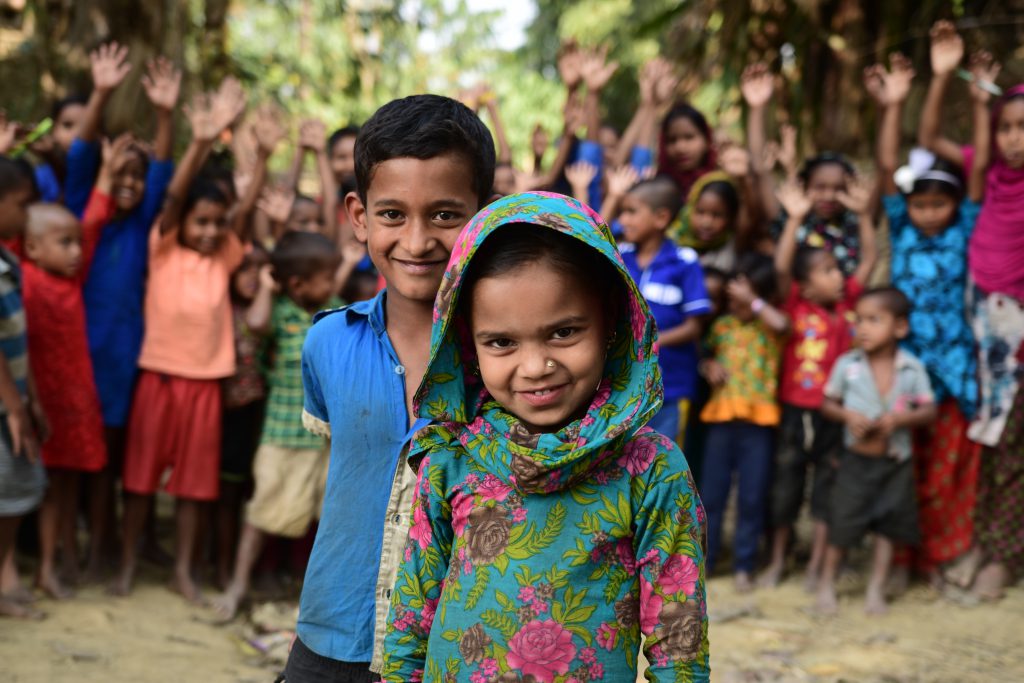A flagship project of USAID’s Office of Health Systems, the Health Finance and Governance (HFG) project supports its partners in low- and middle-income countries to strengthen their health systems and expand access to life-saving health services. With activities in more than 40 countries, HFG collaborates with stakeholders to protect families from catastrophic health costs, expand access to priority health services, and ensure equitable population coverage.
In Bangladesh, the HFG project collaborated with government ministries, academia, non-governmental organization (NGO) partners, development partners, media, and civil society to strengthen the governance and technical capacity, knowledge base, and evidence that will enable the country to make progress toward universal health coverage (UHC). We supported two key initiatives of the Bangladesh government’s UHC agenda: Health Care Financing Strategy HCFS (2012–2032) and the 4th Health, Population, and Nutrition Sector Programme (4th HPNSP; 2017–2022), both of which aim to improve access, equity, and efficiency of health care.
The HCFS was finalized just as the HFG project started in 2012. We supported the Health Economics Unit (HEU) of the MOHFW, along with other partners, to finalize the HCFS and develop the implementation plan and the UHC communication strategy linked to the HCFS. Our initiatives to strengthen UHC awareness supported the MOHFW’s UHC communication strategy, and strongly complemented government efforts to develop a critical mass of professionals in the public, private, and NGO sectors to implement the UHC agenda. Work on this front increased attention to people’s health needs and the UHC agenda and built a common understanding of UHC and its financial significance, particularly the need to reduce financial barriers and address high OOP spending.
HFG conduct a series of studies for USAID’s Smiling Sun clinic network; the network also receives funding from the U.K.’s Department for International Development (DFID). The findings would inform the network’s efforts to improve financial protection on the demand side and financial viability and sustainability on the supply side. We conducted these studies in partnership with the James P. Grant School of Public Health at BRAC University.
- HFG conducted an assessment of the price elasticity of health services to better understand how increases in the price of health services provided at Smiling Sun facilities may affect service utilization.
- HFG also undertook a discrete choice experiment to assess the relative importance of different user preferences in determining how people decide where to seek health care services. The focus was on “Understanding client preference to guide the prioritization of interventions for increasing demand at NGO Health Service Delivery Project clinics in Bangladesh”.
- HFG conducted a “Feasibility analysis of Bangladesh NGO provider-based prepayment schemes”. The analysis was based on costing, competitor analysis, and demand analysis studies.
A USAID-HFG assessment (Cavanaugh et al. 2015) had identified awareness building as critical for clear, strengthened priority setting on UHC. While the government had endorsed UHC, limited understanding meant little action, with many equating UHC with the current ‘free’ public provision of health care. Working closely with the HEU at MOHFW, HFG addressed this knowledge gap through multiple activities: customized orientation sessions for different stakeholders, short courses on UHC, policy dialogues with practitioners and experts, multi-stakeholder dialogues at the regional level, technical discussions with journalists, and TV talk shows. HFG reached over 3,350 individuals—including local health professionals, civil society, teachers, students, elected and government officials, journalists, and private sector—through its UHC awareness activities in 10 districts and the capital, Dhaka.
Another significant HFG contribution was in providing data to the government to improve services planning under UHC. The costing study and resource modeling analysis that we conducted to help plan the implementation of Bangladesh’s revised essential service package (ESP) are important pieces of work that will enable the country’s policymakers to assess costs and identify and close resource gaps to ensure attainment of health service coverage goals. HFG also marshaled evidence to inform the design of financial protection options to reduce financial barriers to access for poor Bangladeshi households. Besides generating evidence to promote informed decision-making, our project helped strengthen the health system by building the implementation capacities of organizations and stakeholders who play a major role in steering Bangladesh’s UHC agenda.



A USAID-HFG assessment (Cavanaugh et al. 2015) had identified awareness building as critical for clear, strengthened priority setting on UHC. While the government had endorsed UHC, limited understanding meant little action, with many equating UHC with the current ‘free’ public provision of health care. Working closely with the HEU at MOHFW, HFG addressed this knowledge gap through multiple activities: customized orientation sessions for different stakeholders, short courses on UHC, policy dialogues with practitioners and experts, multi-stakeholder dialogues at the regional level, technical discussions with journalists, and TV talk shows. HFG reached over 3,350 individuals—including local health professionals, civil society, teachers, students, elected and government officials, journalists, and private sector—through its UHC awareness activities in 10 districts and the capital, Dhaka.
Another significant HFG contribution was in providing data to the government to improve services planning under UHC. The costing study and resource modeling analysis that we conducted to help plan the implementation of Bangladesh’s revised essential service package (ESP) are important pieces of work that will enable the country’s policymakers to assess costs and identify and close resource gaps to ensure attainment of health service coverage goals. HFG also marshaled evidence to inform the design of financial protection options to reduce financial barriers to access for poor Bangladeshi households. Besides generating evidence to promote informed decision-making, our project helped strengthen the health system by building the implementation capacities of organizations and stakeholders who play a major role in steering Bangladesh’s UHC agenda.
Announcements and successes
- Targeting the Poor for Universal Health Coverage Program Inclusion: Exploring a More Effective Pro-poor, Targeting Strategy
- HFG Bangladesh Closing Ceremony
- Bangladesh needs a new social protection program to achieve Universal Health Coverage
- Building an Understanding of Universal Health Coverage in Bangladesh
- Bangladesh Flagship Course on Health System Strengthening and Universal Health Coverage A Success
- Bangladesh: Roundtable Discussion on Universal Health Coverage
- Building Support for UHC in Bangladesh
- Urban Health Financing in Bangladesh in the Context of Universal Health Coverage
- Analyzing Bangladesh’s Grant Funding
- Bangladesh’s Smiling Sun Program Offers Insights to Care-Seeking, Access
Publications
- Repositioning the Health Economics Unit
- Accelerating Progress on Universal Health Coverage Hinges on Local Level Awareness and Engagement
- Harnessing Universal Health Coverage (UHC) Awareness: Evidence to Action in Bangladesh
- Building Awareness for Universal Health Coverage: Advancing the Agenda in Bangladesh
- Sustaining Universal Health Coverage (UHC) Awareness: Healthy Bangladesh Platform
- In Bangladesh, Dialogue on Stakeholder Roles in Moving Closer to Universal Health Coverage
- Bangladesh NGO Provider-Based Prepayment Schemes Feasibility Analysis
- Implementing Universal Health Coverage on the Ground: The View from Four Countries
- Landscape of Prepaid Health Schemes in Bangladesh
- Reproductive, Maternal, Newborn, and Child Health (RMNCH) Expenditure Bangladesh
- Estimating Bangladesh Urban Healthcare Expenditure Under the System of Health Accounts (SHA) 2011 Framework
- Mobile Money for Health Case Study: Aponjon (MAMA Bangladesh)
- Essential Package of Health Services Country Snapshot: Bangladesh
- Tracking Urban Health Expenditures – Preliminary Results from Secondary Analysis of Bangladesh National Health Account
- Understanding Client Preferences to Increase Demand at Bangladesh Clinics
- USAID-World Bank Public International Organization (PIO) Grant Funding Analysis
- Assessment of the price elasticity of demand for health care services in the Smiling Sun Franchise Program
- Piloting L3M for Child Marriage: Experience in Monitoring Results in Equity Systems in Bangladesh
- Indicators for Measuring Universal Health Coverage: A Five-Country Analysis (DRAFT)



